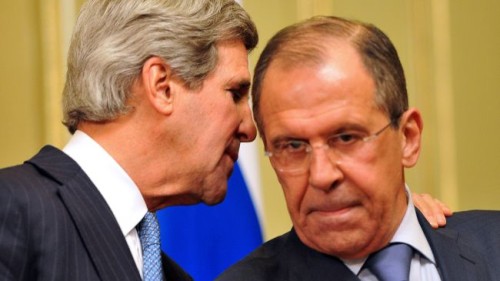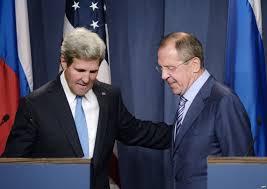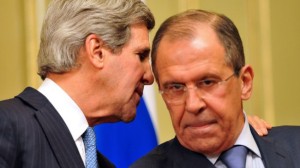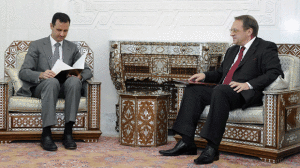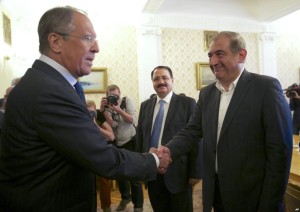EXECUTIVE SUMMARY
Since the Assad regime launched chemical weapons attacks against opposition-controlled areas near Damascus on August 21, Russia has pursued an effective political and propaganda strategy to turn its ally’s weak, defensive position into one of ongoing strategic advantage.
In the immediate aftermath of the August 21 chemical attacks, Moscow faced international condemnation of its ally, and the very real threat of Western military intervention against the Assad regime. Moscow’s extensive provision of conventional weapons to Damascus — including possibly the munitions used to deliver the chemical attacks —might also be held up to scrutiny. More pressing for Russia was the very serious risk that Syrian President Bashar Al Assad may have been be required to step down, in what would be a blow for the regime and for its allies.
Russia initially countered these threats to the Assad regime and to its own position with a strategy of disinformation —blaming the insurgents for the August 21 attacks; and delay, forestalling threats of military intervention by the US and other powers.
Moscow’s strategy was unexpectedly bolstered as quickly as August 31, when US President Barack Obama suddenly pulled back from air strikes. Moscow then seized an opportunity two days later — deliberately or inadvertently presented by US Secretary of State John Kerry — when it set out a process for the inspection and handover of Syria’s chemical weapons stocks.
Moscow has used that process to make President Assad indispensable in the short-term, while garnering support for prospect of an international peace conference in Geneva that would offer a political resolution with Assad retaining power. Meanwhile, Russia has continued to supply the arms essential to the Syrian regime’s ongoing and intensified conventional military offensives, and has provided essential assistance in propping up Assad’s deteriorating economy.
MEETING THE CHALLENGE OF THE AUGUST 21 CHEMICAL WEAPONS ATTACKS
At dawn on August 21, 2013, forces loyal to Syrian President Bashar al-Assad launched a series of chemical weapons attacks near Damascus, which killed hundreds of civilians across 12 locations in the East and West Ghouta areas.
Moscow’s immediate response to the news of the attacks was to express doubt that chemical weapons had been used at all. At the same time Russia emphasized that, if an unconventional assault had taken place, a group of insurgents must have been responsible.
Mere hours after the attacks, Foreign Ministry spokesman Aleksandr Lukashevich claimed that they had been “a provocation planned in advance”.
Countering media reports of the emerging story of a large-scale unconventional attack, Lukashevich added that, “Biased regional media have immediately, as if on command, begun an aggressive information attack, laying all the responsibility on the government.”
Though it was impossible at that point for Russia to have any knowledge of key details of the attacks, such as munitions types and trajectories, Lukashevich set out the key points of his disinformation campaign. According to him, the munitions used in the attack were “home-made” (indicating that insurgents, not the regime, were responsible); and were fired from a position held by opposition forces.
Citing unnamed sources, Lukashevich told reporters that a “home made rocket with a poisonous substance that has not been identified yet — one similar to the rocket used by terrorists on March 19 in Khan al-Assal (in Aleppo Province)— was fired early on August 21 from a position occupied by the insurgents.”
Russia’s initial propaganda campaign, aimed at sowing the seeds of public doubt as to who was culpable for what was clearly a massive attack with a high death toll, was unwittingly aided by popular bloggers who made quick declarations that munitions used in the attacks were of domestic origin. Seizing the opportunity, Moscow also played up the alleged link between the August 21 attacks and a far smaller incident in Khan al-Assal near Aleppo, about which Russia has claimed to have evidence of insurgent culpability.
The claim was clearly a false link: it was obvious — from activist videos and reports, from testimony from medics at makeshift field hospitals and by eyewitness reports — even very early on August 21 that multiple sites across Damascus suburbs had been hit in simultaneous attacks, that many hundreds of civilians had been affected, and that the death toll was very high. It was impossible to ascertain from where the rockets carrying the chemical agent had been fired, with the details of likely trajectories only revealed on September 17 in a United Nations inspectors’ report.
But this was beside the point. Moscow was not seeking truth and clarity about the events of August 21. To the contrary, Russia’s strategy was to “muddy the waters” about the Assad regime’s responsibility for the attacks — just as it had done in July when, faced with declarations by both Britain and France that they had proof of the Assad regime’s use of sarin, Russia handed a report to the United Nations in it suggested that the insurgents carried out the Khan al-Assal attacks.
The problem for the Russians, however, was that its disinformation campaign did not appear to be deterring the US and its allies, who in the days after the attacks were all moving towards military intervention and were publishing details of declassified intelligence reports to blame the Assad regime.
A week after the attacks — as UN weapons inspectors were given limited access to sites near Damascus — Russian Foreign Minister Sergei Lavrov pushed for the US to hold fire on any decision to strike Assad, urging US Secretary of State John Kerry to await the results of the UN investigation.
“A chance must be given,” Lavrov said, for a “political solution” to the Syrian crisis.
The Foreign Minister’s stalling tactic had two main advantages for Moscow and for its ally. The first was practical. Delaying US military intervention gave Assad breathing room to pursue his intensified offensive against opposition-controlled areas in the Damascus suburbs, which he postponed only for the few hours the UN inspectors were in the Ghouta region. Assad was also given sufficient time to move his military assets in central Damascus out of the way of any military strike on the capital. On the same day as Lavrov urged Kerry to give the UN time to work, Assad evacuated personnel from army and security command headquarters in the center of the capital, including the General Staff Command Building on Umayyad Square, the nearby air force command, and the security compounds in the Western Kfar Souseh districts.
The second advantage for Russia was that, by encouraging the US to wait for the results of the UN report, it had more time to continue and even ramp up its propaganda campaign over the events of August 21.
Yet, while Moscow’s move to stall US airstrikes worked, Russia walked a dangerous line. Moscow was well aware that the UN report for which it was urging the world to wait would almost certainly reveal that a wide-scale chemical weapons attack against multiple locations and with extensive casualities had occurred on August 21. And while it was outside the mandate of the UN Mission to apportion blame, Russia knew full well that the findings would likely point to regime culpability.
How could Moscow guard against that possibility?
SEIZING AN OPPORTUNITY
On September 9, the diplomatic tide turned for Russia and the Assad regime, thanks to assistance from an unexpected source: US Secretary of State John Kerry.
Asked in a London press conference whether there was anything Assad could do to prevent US strikes, Kerry said: “Sure, he could turn over every single bit of his chemical weapons to the international community in the next week…without delay and allow the full and total accounting for that, but he isn’t about to do it and it can’t be done, obviously.”
Lavrov seized on Kerry’s response, and turned it into a diplomatic breakthrough.
As Kerry was sitting in an airplane en route from London to Washington, he received a telephone call from his Russian counterpart who called to inform the US Secretary of State thathe was about to make a statement in Moscow.
That statement was public even before Kerry landed in Washington:
We are calling on the Syrian authorities [to] not only agree on putting chemical weapons storages under international control but also for its further destruction and then joining the Organization for the Prohibition of Chemical Weapons….We have passed our offer to [Syrian Foreign Minister] Walid Al Muallem and hope to receive a fast and positive answer.
Muallem, in Moscow for talks with Lavrov, seized on the idea, saying that the Assad regime was willing to consider it.
And Russia also won the support of President Obama, who was condemning Assad’s “gassing of children” but delaying any military action until he had consulted Congress.
By the end of September 9, Obama had gone on record to say that that the Russian proposal to monitor and ultimately destroy Assad’s chemical weapons “could potentially be a significant breakthrough”.
Finally, the Assad regime could breathe easier. And Moscow could celebrate: on the verge of defeat in late August, it had thrown up smoke screens and stalled until it had an opportunity to turn the diplomatic table to its advantage.
THE RISK TO MOSCOW OF SUCCESS
Russian success brought another challenge, since a deal over chemical weapons inspection would also promise the long-planned Geneva II “peace”conference.
Moscow and the US had proposed the gathering since April, but it was repeatedly stalled by the opposition’s refusal to attend without a promise that President Assad would give up power.
Now Russia had to counter any prospect that the diplomatic break-through would be accompanied by such a promise.
Foreign Minister Lavrov welcomed the participation of “moderate” insurgents at the conference and he did not “rule out that the armed opposition, if it does not stand for extremism or terrorism views, could very well be represented”.
At the same time, Moscow put a priority on doubts that the insurgency, which it still blamed for the chemical weapons attacks in March and August, would co-operate with the international inspectors.
A day after the Organization for the Prohibition of Chemical Weapons began its work in Syria, Deputy Foreign Minister Mikhail Bogdanov expressed doubts that the inspectors would be able to reach all chemical weapons sites, given that some were in insurgent-controlled territory:
What we really care about, and what will be objectively no small problem, is that the locations of the chemical weapons or their components will not be easy to reach. Because in principle the chemical arsenals are under the control of the Syrian government. Though, I think, not all of them. But those warehouses which are controlled by the government, can only be reached by crossing areas that are under Opposition control. And this raises the question of how to get there.
The Deputy Foreign Minister, claiming “a certain mutual understanding with our Western partners”, said there was agreement on “the existence of real risks and provocations of all kinds, due to the fact that terrorists and extremists who aren’t interested in a peaceful settlement of the Syrian crisis, and in the elimination of chemical weapons, can create various obstacles, and quite serious ones”.
How could this risk be met? Bogdanov suggested a possible role for the Russian military — a move that could allow Moscow to help the Syrian regime secure territory — under the guise of his comment, “The question is how to cross these areas and to provide reliable security for the OPCW experts.”
Meanwhile, Foreign Minister Sergei Lavrov repeated:
We proceed from the assumption that the episode on August 21 was not the only attack which [the U.N. inspectors] should investigate….
The information concerning our investigation of the incident near Aleppo on March 19 is available to all members of the U.N. Security Council and, as far as I am concerned, it is even in open access….
Everything is laid down there in a professional way and we have no doubts that the toxic agent sarin, which was used near the city of Aleppo on March 19, is home-made and was made in clandestine conditions….
We also have the information that during the notorious episode on August 21…sarin, of approximately the same origin as the neuro-toxic agent used on March 19 but only in a larger concentration, was used.
KEEPING UP THE PRESSURE, MAINTAINING MOMENTUM
With Washington having stepped away from any military action in Syria, and with tacit support for Russia’s lead on the Geneva II peace conference, Moscow has been able to maintain the momentum for the talks to take place at the end of November.
Both Moscow and Damascus have been able to make extensive political capital out of the reaction of the opposition Syrian National Council, which remains adamant that it will not attend unless Assad is asked to step down, and that it will quit the Syrian National Coalition — the umbrella group representing the opposition — if that organization attends the negotiations.
While portraying the Syrian National Council and Syrian National Coalition as divided and fragmented, Moscow has also carefully crafted an image of these groups as an “external” opposition, backed by interested Western powers and detached from events on the ground. In contrast, Moscow has used an October visit by Syrian Deputy Prime Minister Qadri Jamil — the leader of the Popular Front for Change and Liberation, ostensibly an opposition party but in practice closely allied with the National Progressive Front, the Baath Party-dominated coalition — to portray the Syrian Government as comprising “internal opposition” factions as well as Baathist ones.
While the issue of the August 21 chemical attacks appears to have receded, Moscow continues to slur the insurgency and stoke Western fears by putting out the line that extremist Islamist foreign-backed insurgents — puppets of the same interested outside forces as Moscow says control the Syrian Coalition — are planning chemical assaults in Syria. The Russia Today news agency quoted Foreign Minister Lavrov on October 11 as saying that, “Some reports indicate that the Al-Nusra Front is planning to smuggle toxic compounds and relevant specialists into Iraqi territory to stage terrorist attacks there this time.”
Russia Today added, “Earlier Russian diplomatic sources said the August sarin gas attack was a special operation of Saudi Arabian intelligence conducted with the help of a radical Islamist militant group operating near Damascus.”
A WIN-WIN FOR RUSSIA AND ASSAD
Overall, Moscow’s strategy is “win-win” for both the Geneva II peace conference and the chemical weapons inspections.
If the insurgency allows the international chemical weapons inspectors to enter territory that it holds, that will check the opposition’s advance on the military front and — should Russian military personnel be allowed to assist the inspection team — raise the possibility of Moscow helping secure parts of Syria for its ally.
If the insurgency do not allow the international inspectors to enter its territory, Moscow and Damascus can blame the opposition for blocking the destruction of the chemical weapons and thus a supposed peaceful solution to the crisis. It will be the insurgency who are creating “provocations”, raising the suspicion that it is really the culprit for the August 21 chemical attacks.
If the Syrian opposition attend the Geneva II peace talks, it will now be forced to do so with the precondition that Assad remain in power, and it will be forced to negotiate with Assad — as it has thus far refused to do.
If the Syrian opposition refuse to attend the Geneva II peace talks, it will be outside of any deal made with Assad. And even if that deal — which is likely to include elections in 2014, in areas controlled by the regime — takes place, and the insurgency will not lay down its arms, Assad can claim the moral high ground.
CONCLUSION
Russia has crafted a diplomatic and political strategy which establishes that — at least for actors outside Syria — it is not the “reality” of events on the ground that matters. Instead, it is how they are presented to audiences at home and abroad.
The United Nations’ report, released in mid-September and which corroborated video evidence and testimony of doctors, citizen journalists, and activists, establishes that the Assad regime almost certainly killed hundreds of its citizens in deliberate chemical weapons attacks on August 21.
Beyond that report, the Assad regime has killed tens of thousands of civilians in assaults since March 2011, before any insurgency that could be blamed for violence against Damascus.
Yet the Russian strategy has largely neutralized the question of responsibility. The initial approach of discrediting the opposition has been followed by the even more productive approach — because it is seen to be “positive” — of co-operation with Syrian authorities for the handover of chemical weapons stocks.
Doing so, those authorities can escape any judgement over August 21. Perhaps more importantly, the Assad regime can pursue deadly conventional offensives — bombarding towns with air strikes and artillery, and laying siege to the point of starving civilians — including attacks on the areas which suffered the effects of chemical weapons.
And Russia can rest assured that it will not be criticized for providing the arms supporting those offensives, as well as the economic assistance propping up the Assad regime.
Instead, Moscow reaps the reward of praise from Secretary of State Kerry for its cooperation with the Organization for the Prohibition of Chemical Weapons:
“I think it’s a credit to the Assad regime, frankly. It’s a good beginning and we welcome a good beginning.”

